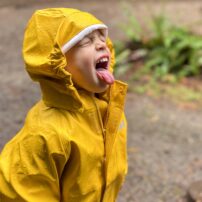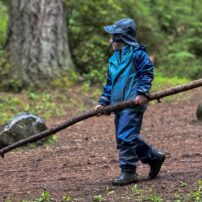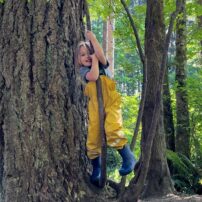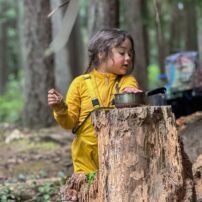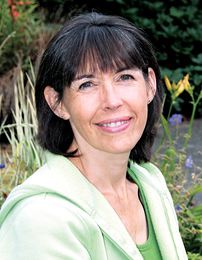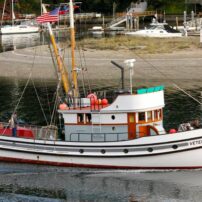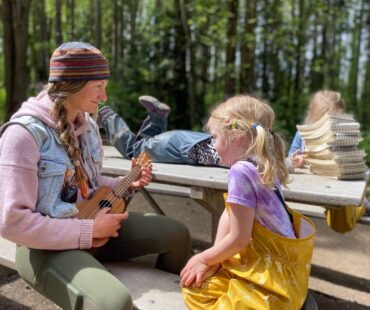 Every day is a good day to be a child at a park, and today is no exception. At the group camping site of Kitsap Memorial State Park, several small children are seated in thoughtful conversation beneath the trees. Close by, a little girl and her friends have collected fir cones and are busily preparing imaginary meals. Two boys are playing on a rope tied to a low-hanging branch, while two others are engaged in a game of chase so silly, they can barely run for giggling.
Every day is a good day to be a child at a park, and today is no exception. At the group camping site of Kitsap Memorial State Park, several small children are seated in thoughtful conversation beneath the trees. Close by, a little girl and her friends have collected fir cones and are busily preparing imaginary meals. Two boys are playing on a rope tied to a low-hanging branch, while two others are engaged in a game of chase so silly, they can barely run for giggling.
This, however, is no random gathering of children for a few hours of fun on a Sunday afternoon. This is school. For the students of Magnolia Forest Preschool, exploring, socializing and running free under the trees is a year-round experience.
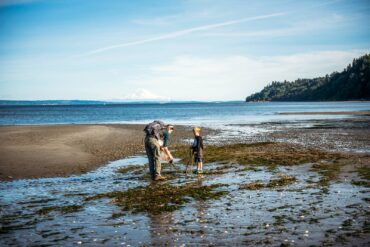 On this early spring day, children ages 2 to 5 — most dressed in matching yellow rain pants — are enjoying moments of sunshine that filter through the customary clouds. Not that weather matters to these hearty outdoors-kids, since their school is entirely outside: rain, shine or snow. In fact, there are only two weather events that change the schedule: School is closed at temperatures of 20 F or below and during high winds, when classes are moved to the open space of Kitsap Memorial field (where kites are added to the curriculum).
On this early spring day, children ages 2 to 5 — most dressed in matching yellow rain pants — are enjoying moments of sunshine that filter through the customary clouds. Not that weather matters to these hearty outdoors-kids, since their school is entirely outside: rain, shine or snow. In fact, there are only two weather events that change the schedule: School is closed at temperatures of 20 F or below and during high winds, when classes are moved to the open space of Kitsap Memorial field (where kites are added to the curriculum).
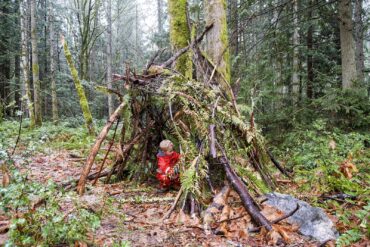 Brandyn Boyd, founder and director of operations, reports that the children find something to love in every season.
Brandyn Boyd, founder and director of operations, reports that the children find something to love in every season.
“There’s a lot of mud in winter,” she reflects, ending her observation with an unexpected: “Mud is super fun.”
Mud is such an accepted part of the experience that one permanent feature of the Kitsap Memorial campus is a “mud kitchen.” This mobile play kitchen, equipped with child-sized plates and cookware, is a magical place where a cup of fir cones may be imagined into cocoa. Mud is optional.
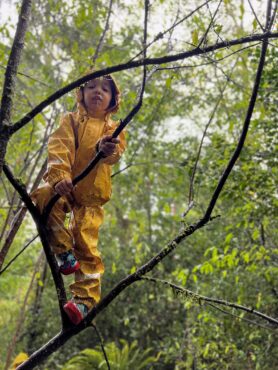 Four hours of fresh-air activity in a forest setting results in children who frequently nap in the car on the way home. Savvy parents bring a large plastic tub in which to have their children stand to change outerwear before climbing into the car.
Four hours of fresh-air activity in a forest setting results in children who frequently nap in the car on the way home. Savvy parents bring a large plastic tub in which to have their children stand to change outerwear before climbing into the car.
“Tired and dirty is our guarantee,” Boyd says with a laugh.
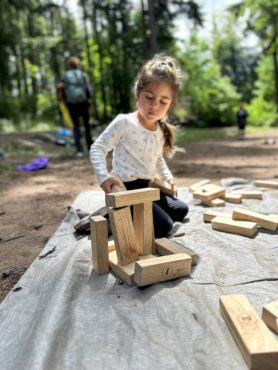 Magnolia Forest is based on the Danish forest kindergarten model. There is no adult-directed curriculum; rather, children take each day in their own direction. Adults regularly present new elements, which students are allowed to explore without context. For example, the recently added slackline (a low tightrope used for balance training) and accompanying handline stretched between two trees was walked on, crawled under, jumped over and swung from with innocent delight.
Magnolia Forest is based on the Danish forest kindergarten model. There is no adult-directed curriculum; rather, children take each day in their own direction. Adults regularly present new elements, which students are allowed to explore without context. For example, the recently added slackline (a low tightrope used for balance training) and accompanying handline stretched between two trees was walked on, crawled under, jumped over and swung from with innocent delight.
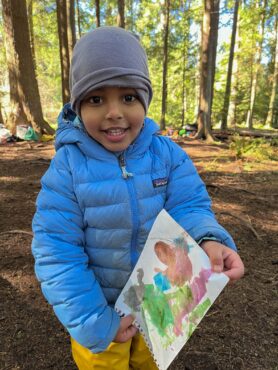 The wooded setting is integral to the experience. Children may be beguiled by a placid snail, a crunchy pile of leaves or a bold pair of crows. Child-sized field glasses are always at hand. Herbalists and park rangers visit to educate the children about the plants that serve as the walls of their “schoolhouse.” Empathy for the living things that surround them comes naturally to the students — with encouragement from their teachers.
The wooded setting is integral to the experience. Children may be beguiled by a placid snail, a crunchy pile of leaves or a bold pair of crows. Child-sized field glasses are always at hand. Herbalists and park rangers visit to educate the children about the plants that serve as the walls of their “schoolhouse.” Empathy for the living things that surround them comes naturally to the students — with encouragement from their teachers.
“We say there are three teachers: the adults, the children and the forest,” Boyd explains. “Our main rule is not to hurt yourself or others.”
Although they are given great freedom, the children are closely — if unobtrusively — monitored. The adult-to-child ratio is 1 to 7. Adults keep in contact with each other via walkie-talkies. When it comes to lunch, the students are allowed to snack on their home-provided food whenever they like, but — in case the busy bodies forget to eat — a “fruit snack” of real fruit is presented partway through the day. The break is popular, owing not only to the fruit but to the accompanying storytime with a book read by one of the adults.
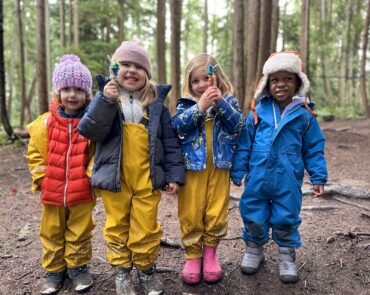 Symbolic thinking is part of the experience (such as fir cones for cocoa), which helps prepare the preschoolers for kindergarten and the introduction of letters and numbers. The students may be pre-literate, but they are encouraged to put down their stories in their individual journals with the help of teachers. At the end of the day, students are given the option of playacting their stories for the group. There’s also science, which — far from theoretical — is a lived experience, surrounded as the school is by biology.
Symbolic thinking is part of the experience (such as fir cones for cocoa), which helps prepare the preschoolers for kindergarten and the introduction of letters and numbers. The students may be pre-literate, but they are encouraged to put down their stories in their individual journals with the help of teachers. At the end of the day, students are given the option of playacting their stories for the group. There’s also science, which — far from theoretical — is a lived experience, surrounded as the school is by biology.
Boyd is grateful for the use of Kitsap Memorial’s group campground, a summer-only camping site that would be otherwise vacant for nine months of the year.
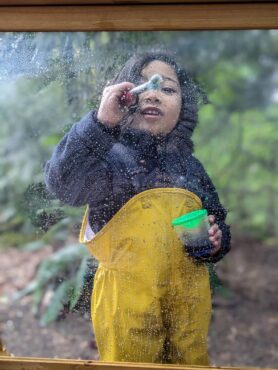 “The state park has been a wonderful host,” Boyd acknowledges.
“The state park has been a wonderful host,” Boyd acknowledges.
Park rangers occasionally become the lesson of the day. Rangers who come to build a fence, clear a trail or even wrap a faucet find themselves the center of attention and often finish the job to a round of youthful applause.
Magnolia Forest Preschool has six locations: Poulsbo (Kitsap Memorial), Central Kitsap (Silverwood), Bainbridge Island, Port Orchard, Sequim and Lynnwood. Three of the schools meet at state parks. The Kitsap Memorial site, founded six years ago, is the original. There’s also a program for children aged 5 to 8; known as Waldkinder, this group meets at Sherman Hill in Poulsbo three times a week.
Each campus offers a summer camp in July and August. In summer, the Kitsap Memorial site moves from the group campground to the beaches of the park and the Shine tidelands.
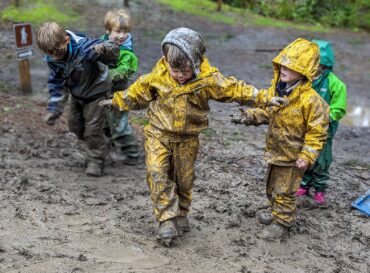 In winter, the students seem barely to notice the temperature. On particularly cold or wet days, teachers may light a campfire in the firepit. Yellow rain slickers join the school’s signature yellow waterproof pants. Clothes are an important consideration for students of a year-round school, so parents are educated in the art of layering, and families are guided by online specialty sites such as the Outdoor School Shop.
In winter, the students seem barely to notice the temperature. On particularly cold or wet days, teachers may light a campfire in the firepit. Yellow rain slickers join the school’s signature yellow waterproof pants. Clothes are an important consideration for students of a year-round school, so parents are educated in the art of layering, and families are guided by online specialty sites such as the Outdoor School Shop.
The goal of this play-based education is the development of empathy, problem-solving skills and a lifetime curiosity and love of learning. In this gently controlled setting, children can take risks, confront fears and gain confidence. To the students, however, it’s all about exploring nature’s playground.
Magnolia Forest Preschool student, Logan, sums it up in two words.
“It’s fun,” he concludes.



